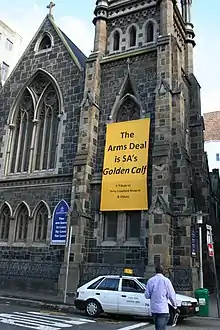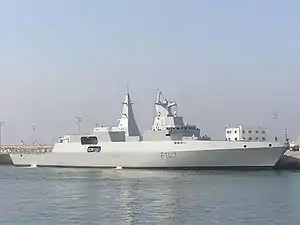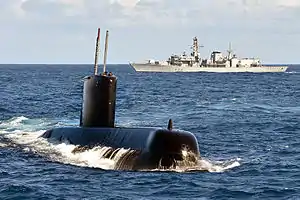South African Arms Deal
The Strategic Defence Package or the Strategic Defence Acquisition, popularly referred to as the Arms Deal was a South African military procurement programme.[1] It involved a US$4.8 billion (R30 billion in 1999 rands) purchase of weaponry by the African National Congress government led by Nelson Mandela in 1999. It has been subject to repeated, seemingly substantive, allegations of corruption.[2][3]

The South African Department of Defence's Strategic Defence Acquisition aimed to modernise its defence equipment, which included the purchase of corvettes, submarines, light utility helicopters, lead-in fighter trainers and advanced light fighter aircraft.
The South African government announced in November 1998 that it intended to purchase 28 BAE/SAAB JAS 39 Gripen fighter aircraft from Sweden at a cost of R10.875 billion, i.e. R388 million (about US$65 million) per plane.
The Arms Deal was plagued by accusations of corruption and in 2011 President Zuma announced a commission of enquiry "into allegations of fraud, corruption, impropriety or irregularity in the Strategic Defence Procurement Packages".[4] The Commission was chaired by Judge Seriti, a judge of the Supreme Court of Appeal and became known as the Seriti Commission.
Review
In a January 2001 report, the Attorney-General of the Western Cape and the SIU's own senior legal advisor recommended further investigation:
[T]here are sufficient grounds in terms of the Special Investigating Units and Special Tribunals Act No 74 of 1996, for a special investigating unit to conduct an investigation, and, in our opinion, such an investigation is warranted.
— Frank Kahn and Jan Lubbe, "Report (A) from the Director Public Prosecutions Western Cape, Advocate FW Kahn SC, and Advocate J Lubbe SC, to the Minister of Justice and Constitutional Development, PM Maduna", January 18, 2001.[5]
A joint investigative team looked at the arms deal in 2000. This team consisted of the auditor general, the public defender and the national director of public prosecution. Their published November 2001 report stated that there were no grounds to believe that the government had acted "illegally or improperly".[6]
But, in October 2009, documents provided by Cape Town businessman Richard Young, whose company, CCII Systems, lost the tender for the navy's new corvettes, showed their initial report had been doctored, factual bases had been removed and its conclusions changed.[6]
Bribery allegations
British and German investigators suspect that bribes of over one billion rand were paid to facilitate the deal.[7] Jacob Zuma, Thabo Mbeki, Schabir Shaik and his brother Chippy Shaik, Fana Hlongwane have been mentioned.[7][8] In March 2003, Tony Yengeni was convicted of defrauding parliament by accepting a bribe while handling the deal.[9] He was sentenced to four years in prison.[9] Andrew Feinstein, an ANC Member of Parliament and the former African National Congress leader of Parliament's public accounts watchdog Scopa, resigned when the party moved to curtail investigations into the arms deal. He wrote a book called After the Party with an insider's view of the process.
Whistleblower Patricia de Lille alleged in Parliament that she had evidence of three payments by warship supplier Thyssen-Krupp on 29 January 1999, each of R500,000, to the ANC, to the Nelson Mandela Children's Fund and to the Community Development Foundation, a Mozambique charity associated with Mandela's wife, Graça Machel.[3]
Sweden
Sweden's Channel 4 investigative programme Kalla Fakta (Cold Facts) uncovered Stefan Löfven's role – a former head of the Swedish industrial union IF Metall and incumbent Prime Minister. In 1999 Löfven was the head of Metall's international section and a good friend of Moses Mayekiso, the former general secretary of the National Union of Metalworkers of South Africa (Numsa). Numsa and the South African National Civics Organisation (SANCO) announced their joint support for the Saab Gripen bid. Mayekiso had by then left Numsa to lead Sanco, though he remained influential within the union. Saab would support Numsa in establishing an Industrial School, supported by Metall and another big Swedish union.[10] They allege that R30 million for the school was in reality a bribe for South African politicians.
After the Party
In his book Feinstein alleges:
- That a report submitted by Scorpions investigators recommended that arms deal corruption involving the ANC itself should be investigated. This was driven by a number of factors, Feinstein writes, including "trips that the party's treasurer general, Mendi Msimang, made to Switzerland to meet the successful bidders";[11]
- That Italian submarine bidders Fincantieri were told they had won the contract, but were informed later that they had been dropped in favour of the Germans. They were offered the chance to "better the Germans" via a payment of $15-million in bribes.[12]
Feinstein points out that this is the same sum under investigation by the German authorities, in relation to an amount allegedly solicited by South Africa's former chief of acquisitions, Chippy Shaik. Shaik has denied the allegation. Feinstein also contradicts public claims by senior government figures that there was no attempt to interfere with the probe into the arms deal once Parliament had authorised a joint investigation team (JIT). He writes: "I was told by someone from the JIT about a meeting with the president at which they… were told who they could and could not investigate."
Elsewhere he claims: "It was made clear to investigators that a shadowy financier close to Mbeki and Zuma who has played an ongoing role in financing the ANC, was off limits." He notes: "For instance, the charge sheet for the arrest of Schabir Shaik was drawn up to charge both Shaik and Zuma. When presented to Bulelani Ngcuka, he is alleged to have responded: 'I will charge the deputy president only if my president agrees.'"[13]
Recounting how he was hauled before the party's top brass after Parliament had authorised its own investigation, Feinstein writes: "I was given a brief opportunity to try to explain the prima facie evidence we had and the process we were following. Within a few minutes Minister in the Presidency Essop Pahad had launched into a ferocious diatribe, spluttering 'Who the fuck do you think you are, questioning the integrity of the government, the ministers and the president?' Pointing aggressively at me, he shouted that we should simply withdraw the resolution."[14]
Requirements
| Description | Original Qty | Illustrative total cost |
|---|---|---|
| Corvettes | 4 | R4 billion |
| Maritime helicopter for corvettes | 5 | R1 billion |
| New submarines to replace Daphne | 4 | R5,5 billion |
| Alouette helicopter replacement | 60 | R2 billion |
| Lead-in Fighter Trainer | 48 | R6-9 billion |
| MBT replacement of Olifant | 154 | R6 billion |
| Total cost in 1998 Rand | R25-38 billion |
Final shortlist
.jpg.webp)


| Item / Country | Original Request | Possible Reduced |
|---|---|---|
| Corvette Requirement | 5 | 4 |
| GEC F3000 | ||
| GFC Meko 200/Meko A200 | ||
| La Fayette | ||
| Bazan 59B | ||
| Maritime Helicopter for Corvettes | 6 | 4 |
| Eurocopter AS 532 | ||
| GKN Super Lynx | ||
| Submarine Requirement | 4 | 3 |
| second-hand Upholder-class submarines | ||
| GSC TR1400 | ||
| DCN Scorpene | ||
| S 1600 | ||
| Kockums T192 | ||
| Lead-in Fighter Trainer Aircraft Requirement | 48 | 24 |
| BAE BAE Systems Hawk | ||
| Advanced Light Fighter Aircraft Requirement | 48 | 26 |
| BAE/SAAB JAS 39 Gripen | ||
| Light Utility Helicopter Requirement | 60 | 48 |
| Agusta A109 | ||
| Eurocopter EC 635 | ||
| Bell 427 | ||
| Main Battle Tank Requirement | 154 | 108 |
| Leclerc | ||
| Challenger 2 | ||
References
- Williams, Rocky (c. 2004). "National defence reform and the African Union". SIPRI Yearbook 2004: Armaments, Disarmament and International Security. Stockholm International Peace Research Institute. p. 237.
- Buthelezi, Mangosuthu (22 November 2007). "Mangosuthu Buthelezi's Weekly Newsletter to the Nation". Ifp.org.za. Inkatha Freedom Party. Retrieved 13 November 2008.
- Bright hopes betrayed Mail & Guardian
- "Arms Procurement Commission". armscomm.org.za. Retrieved 21 January 2017.
- "Report (A) from the Director Public Prosecutions Western Cape, Advocate FW Kahn SC, and Advocate J Lubbe SC, to the Minister of Justice and Constitutional Development, PM Maduna". 18 January 2001.
- "Mbeki, Manuel 'doctored arms deal report'". News24. 22 October 2009. Archived from the original on 6 July 2014.
- The ANC's awful choice Prospect Magazine
- Arms deal: Who got R1bn in pay-offs? Mail & Guardian
- Carroll, Rory (19 March 2003). "ANC's apartheid-era hero jailed for fraud". The Guardian. Manchester, UK.
- Swedish TV reveals fresh claims in South Africa's arms deal M&G
- The central role of the President in a corrupt deal MARK GEVISSER ON MBEKI AND THE ARMS DEAL
- A very odd way to buy a submarine Mail & Guardian
- "I will take ANC down with me if charged, vows Zuma". armsdeal-vpo.co.za. 10 November 2007. Retrieved 21 January 2017.
- Feinstein on Essop Pahad PoliticsWeb
External links
- DEFENCE ACQUISITIONS – UNPACKING THE PACKAGE DEALS Jakkie Cilliers, Institute for Security Studies – Occasional Paper No 29 – March 1998
- The Arms Deal Virtual Press Office
- Thales's acquisition plan does little for its stock
- Arms deal: 'Ministers got millions' M & G
- Mbeki killed BAE bribery inquiry M & G
- ANC's arms committee condemned IOL
- How arms-deal 'bribes' were paid M & G